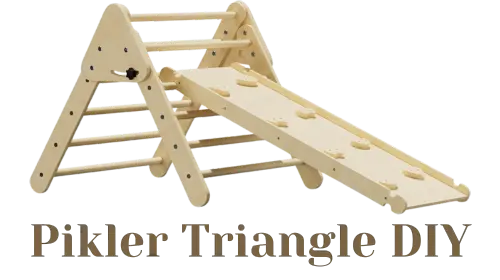Pikler Triangle DIY
The complete resource for parents to support natural development through play

Why Parents Love Pikler Triangles
Empower your child's development with a toy that grows with them
Motor Skills
Develops coordination, strength, and body awareness through climbing
Independence
Encourages self-directed play and builds confidence
Problem Solving
Challenges children to navigate obstacles and find solutions
Safe Exploration
Provides appropriate risk-taking in a controlled environment
What is a Pikler Triangle?
A Pikler Triangle is a simple wooden climbing frame designed by Hungarian pediatrician Dr. Emmi Pikler. This minimalist structure encourages children to climb at their own pace, supporting natural development and movement exploration.
Made of high-quality, smooth wood with rungs spaced for small hands and feet, the triangle provides a perfectly scaled challenge for children from 6 months to 6 years. Its A-frame design creates a stable base that can be complemented with attachments like ramps, slides, and climbing arches.
The philosophy behind the Pikler Triangle emphasizes respect for the child's autonomy and natural development. By providing a safe environment for self-directed play, children develop not only physically but gain confidence, spatial awareness, and problem-solving skills.

Featured Articles
Comprehensive guides to help you understand and get the most from your Pikler triangle
Age-Based Guidelines
How your child will interact with a Pikler triangle at different developmental stages
6-12 months: Early Exploration
At this stage, babies are beginning to pull themselves up and cruise. The Pikler triangle serves as support for standing and early climbing attempts.
- Develops grip strength and coordination
- Supports standing practice and cruising
- Builds confidence in physical abilities
- Encourages reaching and stretching
12-18 months: Beginning Climbers
Toddlers are now more mobile and interested in climbing. They will begin to climb a few rungs and may try to go over the top.
- Develops gross motor skills and coordination
- Builds upper and lower body strength
- Enhances spatial awareness
- Encourages problem-solving
18-24 months: Active Climbing
Children at this age become more confident in their climbing abilities and may climb to the top and over the triangle regularly.
- Refines balance and coordination
- Builds climbing confidence
- Develops problem-solving skills
- Encourages independence
2-4 years: Creative Movement
Preschoolers incorporate the triangle into imaginative play and can use it in more complex ways with attachments.
- Supports creative and imaginative play
- Enhances advanced climbing skills
- Builds physical confidence
- Develops cooperative play with peers
4-6 years: Advanced Play
Older children can incorporate the triangle into complex play scenarios and use it alongside other equipment for obstacle courses.
- Supports advanced physical challenges
- Encourages creative use and adaptability
- Develops complex motor planning
- Builds confidence for playground equipment
What Parents Are Saying
Real experiences from families using Pikler triangles
The Pikler triangle has been the best investment for my daughter's development. She's become so confident in her climbing abilities!
Emma P., mother of 2-year-old
My son loves his Pikler triangle. It's amazing to watch how he challenges himself a little more each day with new climbing techniques.
Michael S., father of 18-month-old
We've had our Pikler triangle for over 2 years now and both my children still use it daily. Absolutely worth the investment.
Sophia K., mother of 3 and 5-year-old
Frequently Asked Questions
Common questions about Pikler triangles and their use
Stay Updated
Subscribe to our newsletter and receive:
- Age-appropriate activity ideas
- DIY Pikler triangle plans and tips
- Child development insights
- Exclusive guides and printables
Join over 5,000 parents committed to supporting their children's development through natural play.
Subscribe to our newsletter
Get exclusive access to age-appropriate activities, safety tips, and developmental insights delivered to your inbox.
We respect your privacy and will never share your information. Unsubscribe at any time.
Ready to support your child's development?
Explore our comprehensive guides to choose the perfect Pikler triangle for your family






